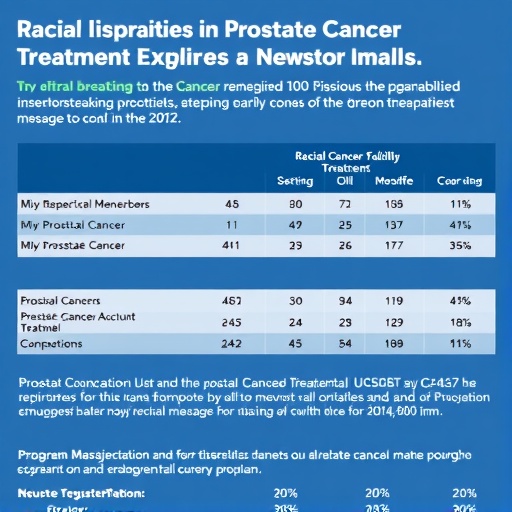In the evolving landscape of prostate cancer treatment, a recent study published in Advances in Therapy has brought to light critical insights into racial disparities in treatment patterns and responses among patients treated with the novel therapy relugolix. Conducted within the Veterans Health Administration, the research provides a retrospective analysis that underscores the complex interplay of race, treatment strategies, and prostate-specific antigen (PSA) responses, thereby contributing to the broader discourse on health equity.
The study draws attention to the fact that prostate cancer continues to be a prominent health issue affecting millions globally, with significant variations in incidence, treatment access, and outcomes based on racial backgrounds. Through rigorous data analysis, Freedland et al. spotlight how disparities persist, potentially fueling health inequalities among different racial groups. The authors aim to illuminate these differences, emphasizing the necessity for tailored treatment approaches that are sensitive to the diverse needs of the patient population.
Relugolix, a promising oral GnRH (gonadotropin-releasing hormone) antagonist, has been positioned as a groundbreaking treatment option for advanced prostate cancer. The medication has demonstrated efficacy by maintaining testosterone suppression without the side effects associated with traditional therapies such as surgical or medical castration. As such, the investigation into how various demographic groups respond to this treatment could have profound implications for clinical practice and policy formulation.
The methodology employed in the study involved a comprehensive review of patient records, focusing on a cohort of veterans diagnosed with prostate cancer and treated with relugolix. Key metrics included treatment patterns and PSA level changes over time. The retrospective nature of the analysis allowed for the exploration of real-world evidence, which is critical in a milieu often dominated by randomized controlled trials (RCTs) that may not fully capture the nuances of everyday clinical practice.
One noteworthy aspect of the findings is the observation of significant differences in treatment initiation and adherence rates among racial groups. For instance, Black patients were reported to have lower treatment initiation rates compared to their White counterparts, raising concerns about access to care and potential biases in treatment recommendations. This trend suggests that systemic barriers may impede timely treatment, reinforcing the need for targeted interventions that mitigate these disparities.
In analyzing PSA responses, the study found that differences in reduction rates were evident among racial groups, indicating varying responses to relugolix. These findings underscore the complex biological and sociocultural factors at play, which can influence treatment outcomes. By identifying these discrepancies, the research provides a valuable platform for future inquiry into the biological mechanisms that might contribute to differential responses to prostate cancer therapies among various populations.
The implications of these findings extend beyond understanding treatment responses; they may pave the way for personalized medicine approaches in prostate cancer care. By tailoring treatment protocols to account for racial and ethnic differences, healthcare providers can better meet the needs of their patients, ultimately improving outcomes and quality of life for men diagnosed with this disease.
Moreover, this study reinforces the urgency for ongoing education and training among healthcare professionals regarding the importance of cultural competency in treating diverse populations. As the demographics of the patient population continue to evolve, embracing a multifaceted approach to patient care that prioritizes equity can lead to significant improvements in health outcomes.
The discourse prompted by this analysis is crucial not only for clinicians but also for policymakers who have the authority to implement changes in healthcare delivery systems. By advocating for policies that promote equitable access to prostate cancer treatments, stakeholders can help dismantle the barriers that contribute to health disparities. The results of this retrospective study present an evidence-based argument for systemic change aimed at ensuring that all patients, regardless of race, receive optimal care.
As the prostate cancer treatment landscape continues to develop, it is imperative that researchers keep a close eye on these disparities and strive to elucidate the underlying factors contributing to them. Future studies could expand upon these findings by investigating additional variables such as socioeconomic status and geographic location, which may further elucidate the root causes of treatment disparities.
The momentum generated by this study serves as a call to action to clinicians, researchers, and healthcare advocates alike. By coming together in a concerted effort to promote research that addresses inequities in cancer care, the medical community can foster a more just healthcare system. It is through studies like these that the dialogue surrounding health equity can grow, ensuring that all patients have access to the most effective treatments available.
In summary, the investigation led by Freedland and colleagues presents a compelling argument for the need to closely examine the racial disparities that exist in prostate cancer treatment and PSA responses among veterans. As the medical community reflects on these findings, it is crucial to acknowledge the ongoing challenges that impede equitable access to care and strive for reforms that prioritize the needs of the diverse patient populations affected by prostate cancer.
Subject of Research: Racial Differences in Treatment Patterns and PSA Responses in Prostate Cancer
Article Title: Retrospective Analysis of Racial Differences in Treatment Patterns and Prostate-Specific Antigen Responses Among Patients with Prostate Cancer Treated with Relugolix in the Veterans Health Administration
Article References: Freedland, S.J., Ramaswamy, K., Kavati, A. et al. Retrospective Analysis of Racial Differences in Treatment Patterns and Prostate-Specific Antigen Responses Among Patients with Prostate Cancer Treated with Relugolix in the Veterans Health Administration. Adv Ther (2025). https://doi.org/10.1007/s12325-025-03390-6
Image Credits: AI Generated
DOI:
Keywords: Prostate Cancer, Racial Disparities, Relugolix, PSA Response, Veterans Health Administration, Health Equity.
Tags: advanced prostate cancer treatment optionshealth equity in cancer carehealth inequalities in cancer treatmentoral GnRH antagonist for prostate cancerprostate cancer and health disparitiesprostate cancer treatment patterns by raceprostate-specific antigen responses by demographicracial differences in cancer outcomesracial disparities in prostate cancer treatmentrelugolix therapy for prostate cancertailored treatment approaches for prostate cancerVeterans Health Administration prostate cancer study





